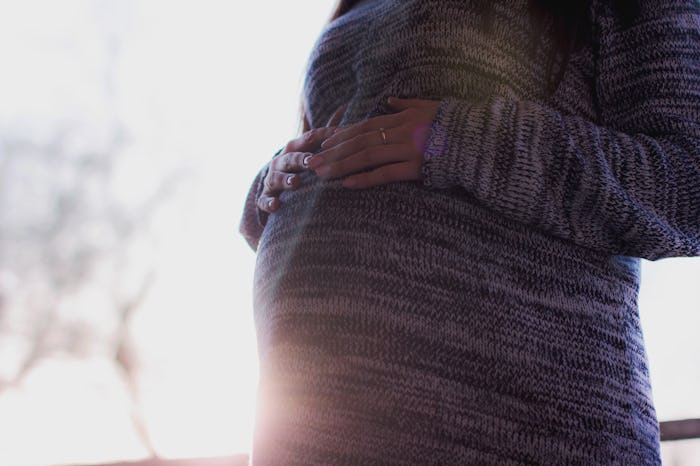Life
Why National Infertility Awareness Week Should Matter To Moms
National Infertility Awareness Week — NIAW, for short — is here. While it might seem like this health observance doesn't affect many people, you'd be surprised. Infertility affects as many as one in eight couples of reproductive age — and me and my husband are one of them. We're one of the lucky couples that made it through infertility to parenthood. Even though you might have had a child or even multiple children of your own with no issues whatsoever, here's why National Infertility Awareness Week should matter to moms.
But first, a little history: In 1989, NIAW started as a movement by RESOLVE: The National Infertility Association. It would be another 21 years before NIAW would become a federally-recognized health observance by the Department of Health and Human Services. Though infertility has certainly received a lot more media attention in recent years thanks to celebrities opening up about their infertility stories, the infertility community still has a long way to go in terms of awareness, education, and support. As a mom after infertility, it's an issue near and dear to me for obvious reasons, but I truly believe that all moms can do their part this NIAW to support their fellow moms after infertility and all those moms-in-waiting.
Barb Collura, President and CEO of RESOLVE, got right into the message at the heart of NIAW: "Infertility is a disease, and we need the public to acknowledge that and understand it," she tells me. When I asked her why NIAW should matter to moms, she says it's a matter of understanding:
When more people understand the impact infertility has on people, we will finally see real change happen. For us, we want to see infertility covered by health insurance like any disease, we want to see more empathy for those living with infertility, and we want to see more awareness and education. If moms everywhere raised their collective voices and pronounced that people with infertility matter, we would finally see that transformative change we so badly need.
Collura's statement that "people with infertility matter" is a powerful one. One of the most emotionally challenging aspects of infertility I experienced was dealing with the (false) notion that I was somehow a "failed" woman. I often felt like shouting at my ovaries: "You had ONE job, guys! C'mon already!" In the flurry of pregnancy announcements and births among my friends and family during the four years I dealt with infertility, I constantly felt left in the dust. NIAW should matter to moms because it helps validate the very real, very painful infertility experiences of their fellow sisters, friends, daughters, coworkers, and more.
There's this shared sisterhood of infertility, one that is all too often shared in silence. Infertility is a disease that can feel so isolating, and yet infertility affects as many as 7.3 million Americans, which is hardly an isolated community. Taking part in NIAW — whether it's through messages of support on social media or even participating in a local Walk of Hope — helps to break down those barriers of isolation and loneliness. And infertility doesn't only include those who have trouble getting pregnant, but it includes those who have trouble staying pregnant, too. When 10 to 25 percent of all pregnancies end in miscarriage, there's a good chance that you know someone who has experienced infertility or baby loss, but maybe they've never opened up to you about it because of how deeply personal and painful those experiences can be.
As a mom after infertility, specifically IVF with a known egg donor, NIAW is important to me in how I raise my son. I want him to grow up proud of who his is and how he came to be. These "non-traditional" origin stories of children who've come to be via IVF or adoption are just as valid, beautiful, and genuine as any other child's origin story. And if we're going to be honest, these origin stories are becoming a lot more common. For any parent, NIAW helps to normalize the origin stories for all children, no matter how they came to be or joined their families.
Finally, I think that moms who acknowledge and support NIAW take a very feminist stance by doing so. I spoke with Pamela Tsigdinos, author of Silent Sorority and an advocate for the childfree community. "In society today we've managed to conflate women's value with motherhood," Tsigdinos says:
This makes an infertility diagnosis doubly difficult. Outside of the physical and deeply emotional somersaults required to reconcile that pregnancy may not happen easily or at all, we're also on the hot seat to explain why we don't have children — as if it justifiably detracts from our worth or contribution to society.
Tsigdinos believes that a woman's worth shouldn't be defined by parental status. When women of all roles — mother or otherwise — take an active part in raising awareness about infertility, they stand together in feminist solidarity for the value and worth of all women, no matter their roles, stations, and paths in life.
If you've experienced infertility yourself to achieve the family you have now, you know how important it is to connect with other people who "get" infertility. National Infertility Awareness Week is the perfect time to think about how you can give back to and help those who are still going through what you've been lucky to get through.
And, for women who have never experienced infertility, I hope they never do. But that doesn't mean that they can't take a moment right now during National Infertility Awareness Week to help raise awareness, spread the word, and make a difference for millions who want nothing more than to be a mom, too.
